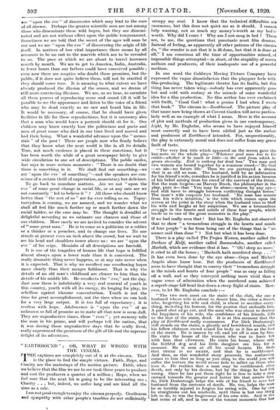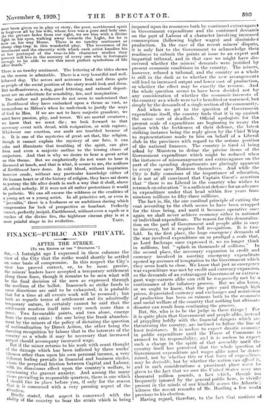" EARTHBOUND " ; OR, WHAT IS WRONG WITH THE
CINEMA.
rill-1E captious are completely out of it at the cinema. That 1_ is the place to find the simple virtues. Faith, Hope, and Charity are the mainstays of the motion picture. Faith, when we believe that the film we are to see took three years to produce and cost the producers a quarter of a million ; Hope, when we feel sure that the next bit is going to be the interesting one ; Charity . . . but, indeed, we suffer long and arc kind all the time as a rule.
I am not good enough to enjoy the cinema properly. Gentleness and sympathy with other people's troubles do not sufficiently
occupy my soul. I know that the technical difficulties are enormous, but this does not quiet me as it should. I cannot help wanting, not so much my money's-worth as my bed's. worth. Why did I come ? Why am I not snug in bed ? These are, to me, the questions that punctuate most film dramas. Instead of feeling, as apparently all other patrons Of the cinema do, "the wonder is not that it is ill-done, but that it is done at all," I am conscious all the time of opportunities missed, of impossible things attempted—in short, of the stupidity of screen authors and producers, of their inadequate use of a powerful medium.
In one word the Goldwyn Moving Picture Company have expressed the vague dissatisfacton that the playgoer feels with film-producing. The legitimate theatre has its faults, but this thing has never taken wing—nobody has ever apparently gone hot and cold with ecstasy at the miracle of some wonderful idea for a film production. No film author has ever exclaimed with Swift, "Good God ! what a genius I had when I wrote that book." The cinema is—Earthbound. The picture play of
that name now being shown at Covent Garden will serve portico- .
lady well as an example of what I mean. Here is the account
of plot and methods of production given in our contemporary, Light, by Mr. Engholm, who seems to have enjoyed himself most correctly and to have been edified just as the author and producers of Earthbound intended. For, unquestionably, the play is extremely moral and does not suffer from any grave fault of taste.
"The very first title which appeared on the screen gave the key-note to the whole play—' Whatever good nuns has to his credit—whether it be much or little—is the seed from which he grows eternally. Evil is nothing but dead loss.' Two men and two women are bound together by a common creed—' No God —no am—no future life.' Then we see portrayed a drama that is as old as man. The husband, held by an infatuation for ills friend's wife, considers be is justified in his action because of his belief arising from his creed of the survival of the fittest. But the man forgets--aa Harvey Breck, the philosopher in the play, puts it--that You may be alone—unseen by any eye— and still have to struggle between conflicting thought forces.' The man's wife suspects her husband. 'No man has secrets from his wife's intuition,' is the title which comes upon the screen at the point in the story when the husband tries to bluff his wife and laughs at her suspicions. We see a tremendous stru ggle in the hearts and minds of these four people, which leads us to one of the great moments in the play."
if we had really seen that ! But has Mr. Engholm not observed
that to show "a tremendous struggle in the hearts and minds of four people" is far from being one of the things that is" no
sooner said than done " ? Not but what it has been done. There is a play called The Trojan Women, another called the Duchess of Malji, another called .flosmersholni, another called Macbeth, which are evidence that it has. "'Oh! sleep no more,'
it cried to all the house ; Macbeth bath murdered sleep. . " It has even been done by the eye alone—Goya and Michael Angelo alone know how. But the producers of Earthbound seem to have thought that to convey their " tremendous struggle
in the minds and hearts of four people" was as easy as falling off a wall, and so they conveyed nothing more vivid than a vague sense of admiration when the murdered man achieved
a superb stage fall head first down a steep flight of stairs. How- ever, to let Mr. Engholm conclude :—
" The two men meet on the stairs of the club, the one a husband whose wife is about to desert him, the other a friend, who, forgetting his wife and child, is about to sacrifice every- thing, including his honour, for the passion that enthralls him. A pistol shot rings cut, and the man who was about to destroy the happiness ot his wife, the confidence of his friends, falls to the foot of the stairs, dead. It is at this moment that the play of Earthbeund really commences. For Dick Desborouer still stands on the stairs, a ghostly and bewildered wraith, and his fellow clubmen crowd round his body as it lies at the foot of the stairs. He is unseen by all, e.nd yet all is seen by him. Ile visits the house of the woman who was to have left with him that eftemoon. He visits his home, where only the faithful deg and his little daughter see him for a moment. He is seen at all his usual haunts. He finds that THERE IS NO DEATH, and that he is earthbound. And then, as this wonderful story proceeda, the realization comes to him that so long as you cling to the world you will suffer the torture the world never fails to inflict on those who love it. Ho realizes that a man may be earthbound, after death, not only by his desires, but by the things he had left wrong. Once he has put them right he is free to take a step onward towards the greater and better life that awaits him. So, Dick Desborough helps the wife of his friend to save her husband from the sentence of death. He, too, helps the man Ile so terribly injured to forgive his erring wife. One by ens he straightens out his misdeeds, until there is but one thing left to do, to win the forgiveness of his own wife. And in the last scene of all, and in one of the tensest moments that has
ever been given us in play or story, the poor, earthbound spirit is forgiven all by his wife, whose love was a pure and holy one. As the picture fades from our sight, we see him with a divine light in his eyes, walking away towards the Light, for he is now on his way Home. There is no tawdry sentiment or cheap clap-trap in this wonderful play. The reverence of its treatment and the sincerity with which each artist handles his or her portrayal of the true-to-life character studies they present will live in the memory of every one who is fortunate enough to be able to see this most perfect symbolism of life after death."
There is no tawdry sentiment. The lettering of the titles shown on the screen is admirable. There is a very beautiful and well- behaved dog. The actors and actresses look and dress quite as people of the social position of the story would look and dress. But inoffensiveness, a dog, good lettering, and rational deport- ment are no substitute for sensibility, fire, and imagination.. The author and producers do not seem to understand that in Earthbound they have embarked upon a theme as vast, as tremendous as Milton's when he undertook to justify the ways of God to Man. If we are not to have majestic grandeur, we must have passion, pity, and terror. We are mortal creatures ; we know that we must die ; we look forward to that neeesmry event with dread, with resignation, or with rapture. Whichever our emotion, our souls arc troubled because of it. It is one of the mysteries of great art that, like religion, though it cannot explain the mystery of our fate, it can calm and illuminate that troubling of the spirit, can give form and even a majestic outline to the tossing chaos of conjecture. And that is why we desire to hear a great artist on this theme. But we emphatically do not want to hear it discussed at lunch, and that is what, it seems to me, the authors of Earthbound have done. In cold blood, without inspiration however crude,. without any particular knowledge either of the human heart or of the history of religion, they have sat down to portray the life after death in such a way that it shall, above all, offend nobody. If it were not all rather pretentious it would be pathetic. We can all excuse the wildness or the crudities of a young art or a young artist. In all primitive art, or even in "juvenilia," there is a freshness or an ambitious daring which compensates for lack of perspective or bombast. Perfectly correct, perfectly insipid, Earthbound, without even a squib or a cracker of the divine fire, the highbrow cinema play is at a most painful stage in its evolution. Taus.







































 Previous page
Previous page